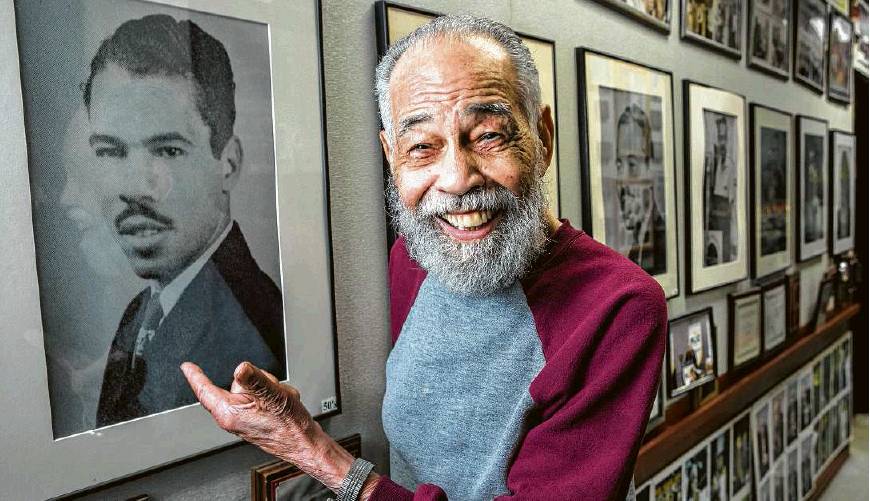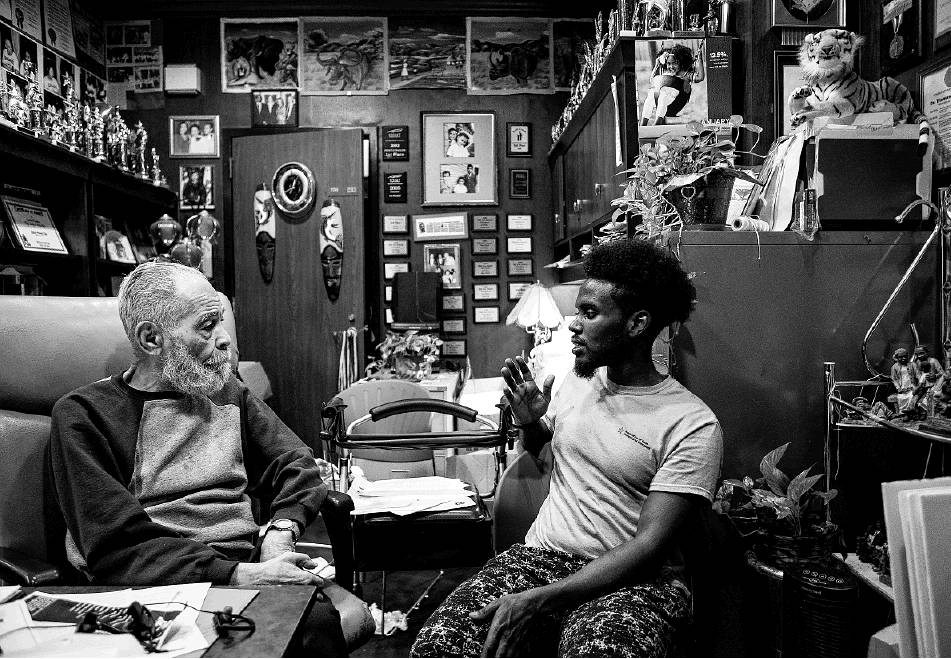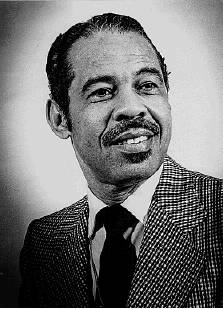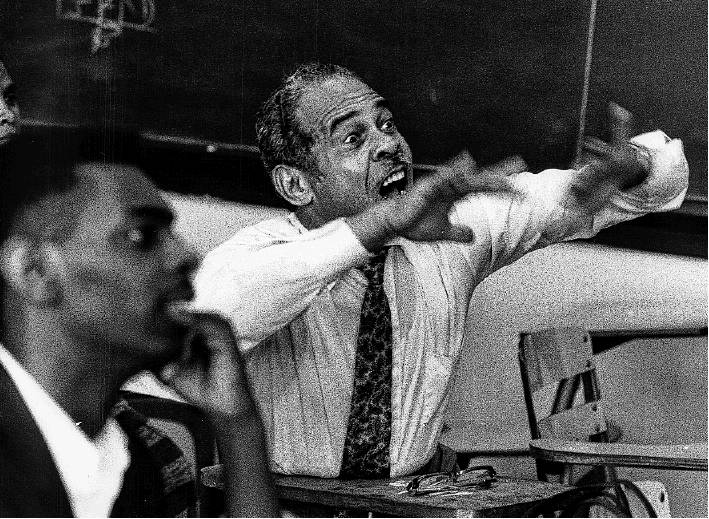Legendary TSU debate coach still molding minds at 100
Houston celebrating his legacy — even as it continues to grow
By Brittany Britto STAFF WRITER
Thomas F. Freeman sits in his office of a six-room suite, gazing at what has become a treasure trove of memories.
With memorabilia spanning decades, the Thomas F. Freeman Center for Forensic Excellence resembles a museum. Pictures of students at the Moulin Rouge in Paris, snapshots of Freeman with actor Denzel Washington, photos of local politicians Mickey Leland and Barbara Jordan, and dozens of trophies of every size line the walls and tables.
The soon-to-be centenarian has built a 70-year legacy at Texas Southern University as a former professor and the lauded longtime head coach emeritus of its award-winning debate team. As Freeman prepares for his 100th birthday Thursday, the Houston community will celebrate him with a weekend of activities, including abrunch sponsored by the debate team Saturday, and a Sunday reception held at the Mount Horem Baptist Church, where Freeman has ministered for the past 68 years.
Similar celebrations have been hosted since Freeman reached his early 90s, but this is a milestone the orator has yet to process.
“I haven’t been able to get outside of myself and feel,” Freeman said. “It’s been 70 years of opportunity, growth, development, challenge, and an example of what can be done through consecration and dedication.”
But Freeman said he had had no intention of working in Houston or staying at TSU. Like most things in his life, he said he had been chosen.
“I did not apply for a single position in my life. I have been taken, chosen.”
From preacher to debater
After receiving acall from Texas Southern, Freeman agreed to teach philosophy at the historically black college for nine months starting in 1949. Freeman said he had intended to return to ministering at his church, Mount Carmel Baptist Church in Richmond, Va. But after he assigned students a debate in a logic course, TSU decided it had found its newest debate coach.
The students, eager to have a team, tried to persuade him, he said, and the university proposed a position, but Freeman insisted it would have to be a short-term deal because he was going back to Virginia.
His coaching was a success. After three months of working with students, TSU’s debate team beat teams at Harvard University and the University of Chicago, and naturally, he said, university colleagues begged him to stay.
The scholar has been there ever since, becoming a renowned on-campus legend who has consulted students and celebrities alike when it comes to forensic speech, or the study and practice of public speaking and debate.
“Kids come here to go to school and when they’re touring, they always seek out Dr. Freeman for his words of wisdom and influence,” said longtime university photographer Earlie Hudnall.
Some even ask him to sign T-shirts or to autograph their skin, said Gloria Batiste-Roberts, 69, Freeman’s successor and current head coach of the TSU debate team.
“If you say you go to TSU, everyone knows Dr. Freeman,” Hudnall said.
Freeman’s 70-plus year résumé includes teaching and working with former U.S. Reps. Leland and Jordan, Harris County Commissioner Rodney Ellis, gospel superstar Yolanda Adams, and Academy Award-winning actor Washington, who sought out Freeman’s expertise to coach the cast of the Golden Globe-nominated film “The Great Debaters.”
While teaching a religion course as a visiting professor at Atlanta’s Morehouse College in 1947, Freeman also taught a student who would become the Rev. Dr. Martin Luther King Jr. Freeman said he only realized it years later after traveling with the TSU debate team to Georgia’s capital.
The civil rights activist walked over to his table, Freeman said. “(He) stuck out his hand and said, ‘Dr. Freeman, you don’t remember me, but I remember you. You taught me.’ ”
Freeman has since led students in dozens of debate championships, claiming eight first-place titles, 45 trophies and top honors at the 2019 HBCU National Speech and Debate Championship in Nashville, Tenn., in March.
And though he retired from teaching six years ago, Freeman is still at it — working in his office for 12 hours a day Monday through Saturday, and after church on Sundays, to assist students and people of the community who request one-on-one consulting.
“The eagerness with which students want to develop and to achieve, and to realize that I have the opportunity of helping them to achieve their goals and objectives,” is what keeps Freeman going, he said.
“There’s something challenging about the opportunity to work to develop a person,” he said.
The level of success and fame Freeman has reached as a university debate coach is rare, but ask him how he does what he does, and he mostly shrugs. It takes practice, he says.
“When the students discover that they don’t have to have any special skills or competencies before coming, they come, and then when they get here, they develop those skills,” he said.
“I don’t think there is a how. You just learn to do it.”
‘You learn by doing’
Since its inception, the debate program at Texas Southern has always been open to any student enrolled at the university. The program traverses genres of oration including poetry, prose, drama, academic speaking and newscasting, and has served as a home away from home for students — many of whom are from out of state.
Members of the team members have traveled out of the country for the first time as they headed to major competitions in London, Madrid, Prague, South Africa, and in March to Berlin, where they won 20 titles, including five first-place awards.
Performing locally at church events, weddings and funerals helps gear up current debate team members for next year’s international competition in Tokyo. Freeman plans to accompany the team just as he did in Germany.
“It’s the level of competition that challenges students,” Freeman said, but he adds with a big laugh: “I’m not the easiest person. I demand the best of them. I don’t accept mediocrity, nor excuses.”
Students have attested to this, describing Freeman as a man generous with his time and talents, but with a fiery, sometimes unorthodox approach.
For example, Freeman frowns at gum chewing, sees drinking from a water or soda bottle during a meeting as an interruption, and is not afraid to correct students’ English, said Antre’chelle Dorsey, 38, the most recent president of the debate team.
He also insists that the word “often” is pronounced with a silent “t,” —any other variation is barbaric — and he preaches that “you learn by doing, not by seeing,” she said.
“He doesn’t play at all,” said Dorsey, who began her undergraduate education at TSU at age
33.
“He’s serious about the rules and the traditions, but furthermore, he evolves with the times.”
Freeman also doesn’t discriminate, according to those who’ve worked with him. He pushes students to find their best approach to public speaking, encourages them to be well-versed and educated in their subject matter, and doesn’t turn anyone away, according to Dorsey and Batiste-Roberts.
“It doesn’t matter if you don’t have any skills or if (students are) feeling insecure,” Batiste-Roberts said. “He feels like he can develop you into a public speaker.”
It’s an approach that has taught Batiste-Roberts to believe in students, no matter how bad they might seem when start out, she said. The debate team’s priority is not just to win, it’s to help students grow.
And though the TSU debate team has won numerous awards — there are four cases of first place trophies in the debate suite alone — there have been challenges along the way.
Launched during a period of segregation, the team initially operated in the Southern Intercollegiate Forensic Conference, a blacks-only student league, since they could not compete at white schools.
Sometimes the team was threatened or refused service while traveling through the South to competitions, and as a result, would pack lunches to avoid stopping at restaurants.
In one instance, while Barbara Jordan, the late congresswoman, was his student, Freeman said students were hungry. Freeman sought food at a nearby restaurant, but was told “We don’t serve blacks here” and was directed to the back of the restaurant, he said.
“I suffered the humiliation of going into the back, but I got food for Barbara” and the other students, he said proudly.
Racism or prejudice, however, has never deterred him, he said.
“The excellence of performance is important,” said Freeman, who accepted a part-time position at Rice University in 1972 and became one of its first black professors.
Like many of his other positions, the Rice opportunity came to him, he said.
The late Niels C. Nielsen Jr., dean of the religious studies department at Rice, approached him about teaching at the private university. Freeman said he declined, saying he couldn’t teach at Rice while at Texas Southern. What he didn’t know was that Nielsen contacted Granville M. Sawyer, president of TSU at the time about the offer. Soon after, Sawyer called Freeman into his office and told him: “Congratulations, I have approved your appointment.”
Freeman taught part time in the Rice Department of Religion for more than 20 years, developing his own courses, exposing students to the religious life in Houston and contemporary religions and becoming one of the most sought-after professors at the university, he said.
He later taught speech courses and English at Houston Community College as an adjunct professor, and began his ministry at Mount Horem.
The moral, he said: “You do better than somebody else and it doesn’t matter what the color of your skin is. Productivity is the most important thing.”
Freeman’s productivity won’t stop with his 100th year. He said he looks forward to the debate team traveling to Tokyo next year, and his office hours will remain the same.
“I enjoy everything I do,” Freeman said. “There’s not a single thing I do that I say, ‘Oh, I wish I didn’t have to do this.”
“Whatever I’m asked to do,” he said. “I will do it.” brittany.britto@chron.com twitter.com/brittanybritto
“There’s something challenging about the opportunity to work to develop a person.”



